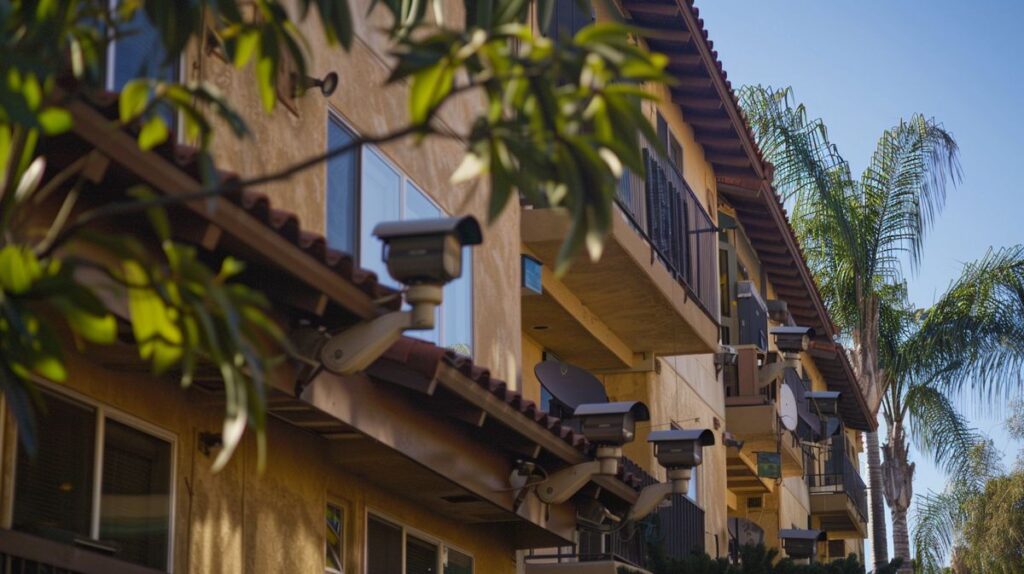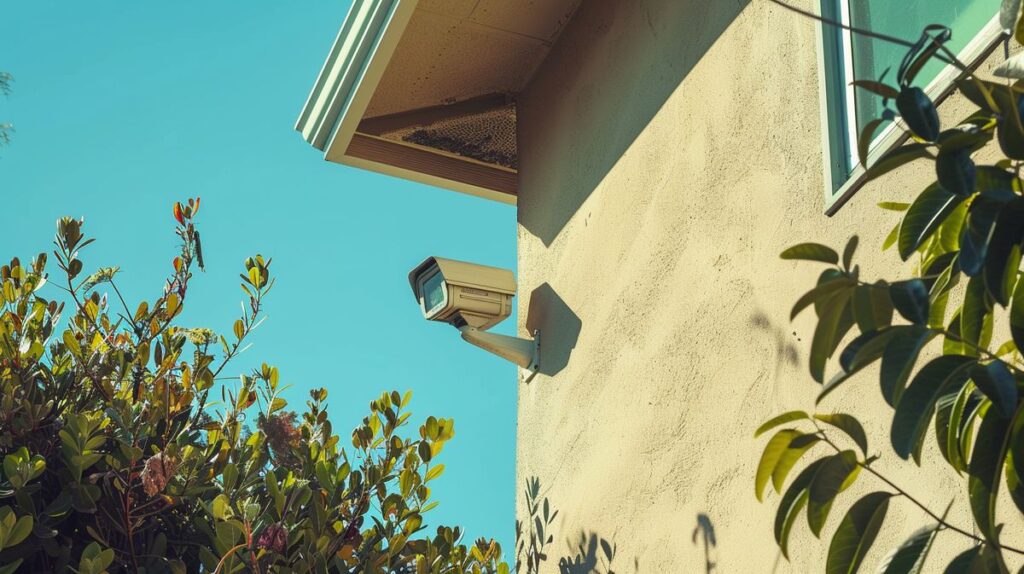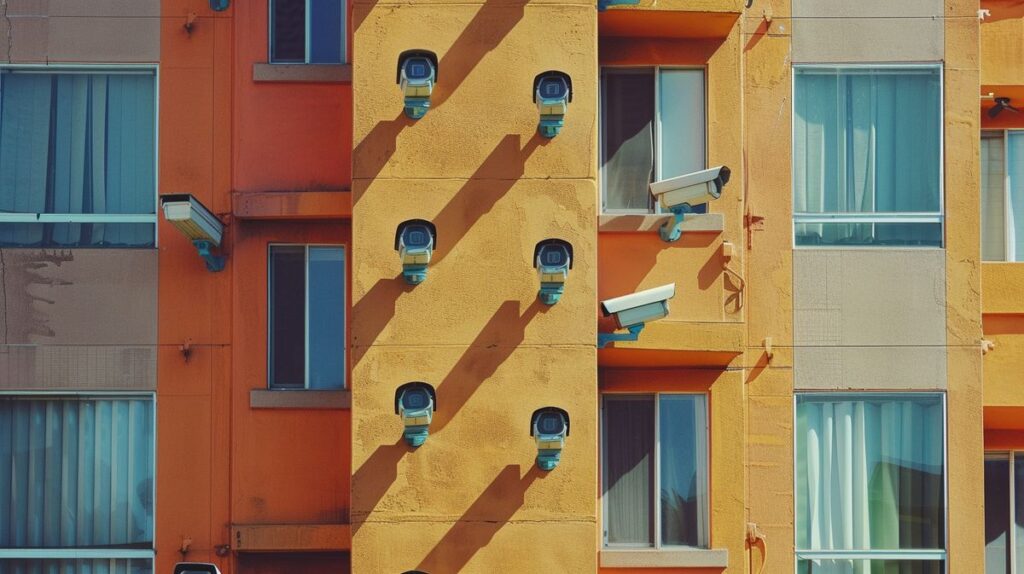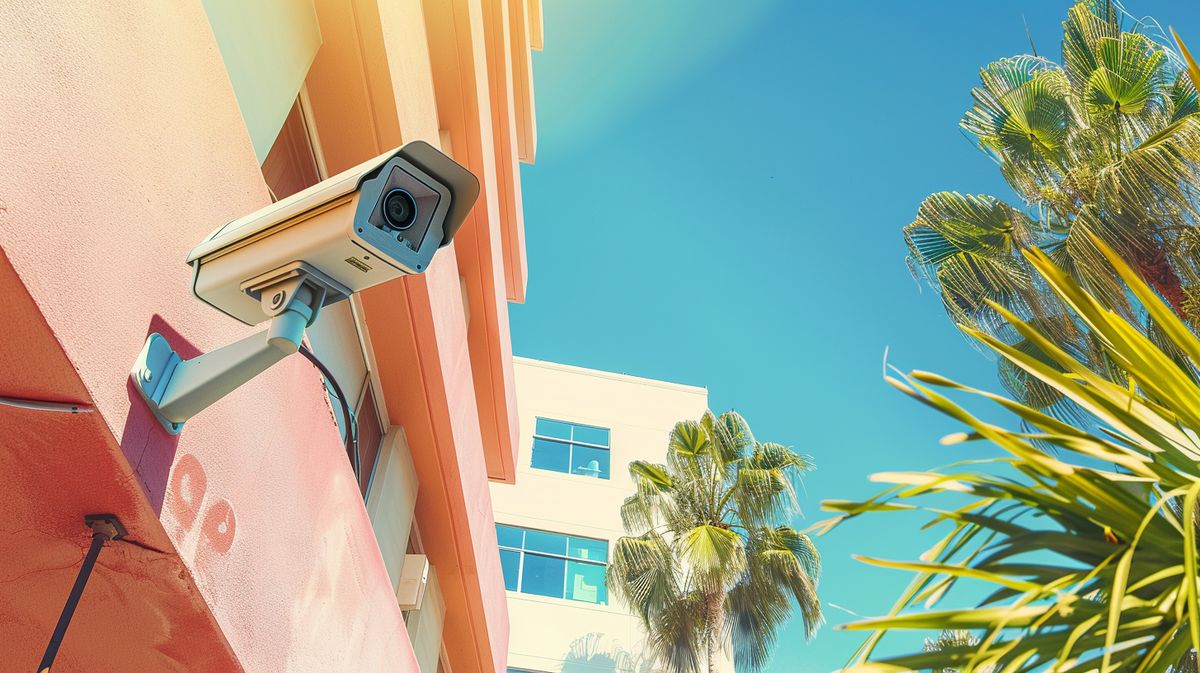Comprehensive Guide: Apartment Security Camera Laws in California
Did you know California has surprisingly strict apartment security camera laws? Hi, I’m James Albright, your friendly home security expert. We’re diving deep into this crucial subject today. Swapping stories over coffee, we’ll explore surveillance camera regulations, placement rules, and privacy rights in the Golden State. It’s like embarking on a quest to find that safe and compliant haven we all crave.
Why did you click on this article? Maybe you’re a worried landlord or a tenant eager to protect your rights. Whatever your reason, this guide is your lifeline. By the end, you’ll know exactly how to play by California’s rules while keeping your apartment fortress intact.
Ready to pierce through the legal fog surrounding apartment security camera laws in California? Let’s begin this enlightening journey together, one step at a time.
Overview of Apartment Security Camera Laws in California
In this section, I’ll walk you through the essentials of apartment security camera laws in California. From the legality of using these devices to the critical restrictions you need to know, we’ll cover it all. Respecting privacy while ensuring security is a fine balance, and understanding these laws will help you navigate it smoothly.
Legal Use of Surveillance Cameras
California laws permit the use of surveillance cameras for both personal and business security purposes. Imagine having an extra pair of eyes to help keep your loved ones safe—doesn’t that sound reassuring? However, you must ensure these cameras don’t invade individual privacy or breach legal restrictions. You can use covert cameras, but remember—they shouldn’t intrude upon someone’s privacy or record audio of confidential communications without everyone’s consent.
Key Legal Restrictions
- Cameras can’t invade a person’s privacy. Avoid placing them in private areas like bedrooms, bathrooms, or changing rooms. Just think about it—would you want a camera in your bedroom?
- Hidden cameras are illegal in non-public areas no matter who owns the property. Violating this can lead to serious civil or even criminal penalties. It’s best to keep it honest and visible.
- When it comes to audio recording, you need consent from everyone involved.
- If you’re looking for home security solutions, consider our guide on Door Sensors That Work with Alexa.
This is in line with California Penal Code 632. No shortcuts here!
Importance of Privacy
The California Invasion of Privacy Act lays down the law on respecting privacy in places where there’s a reasonable expectation of it.
This means your surveillance must respect personal spaces where private activities occur, like apartments and individual private rooms. Think of it as invisible boundaries you must respect to avoid legal troubles.
In this video, you’ll learn about the legal framework governing the use of security cameras in residential settings, including privacy expectations and consent laws that are crucial for understanding Apartment Security Camera Laws in California.
Understanding and sticking to these expectations is key to maintaining both ethical practices and legal compliance.
Placement of Cameras in Apartment Complexes
Understanding where you can legally place security cameras in your apartment complex is crucial. Camera placement not only impacts the security of the premises but also ensures compliance with state laws. Let’s dive into the specifics of where cameras can and cannot be installed according to Apartment Security Camera Laws in California.
Invalid YouTube video ID
Legal vs. Illegal Camera Locations
- Legal Placements: According to Apartment Security Camera Laws in California, cameras may be installed in common-use areas such as mailrooms, laundry rooms, hallways, staircases, elevators, entry and exit points, game rooms, and parking lots. These locations are considered public spaces where tenants do not have an expectation of privacy.
- Illegal Placements: In contrast, it is illegal to place surveillance cameras in areas where tenants have a reasonable expectation of privacy, such as bathrooms, bedrooms, and private apartment units. These are protected spaces, and installing cameras in these locations could lead to significant legal repercussions.
Common Areas vs. Private Spaces
- Common Areas: Surveillance cameras are permitted in hallways, shared entryways, and laundry rooms. These are areas where tenants conduct activities in a public setting and do not possess an expectation of privacy. Hence, installing cameras in these locations is generally considered lawful.
- Private Spaces: On the other hand, cameras cannot be installed inside a tenant’s personal apartment unit or aimed specifically at a tenant’s front door for the purpose of monitoring individual behavior. These actions undermine the privacy rights of the tenant as defined by Apartment Security Camera Laws in California.
Specific Prohibitions
- Monitoring Tenant’s Personal Space: Using surveillance cameras to monitor areas where tenants conduct personal activities, such as inside their apartments or other clearly private areas, is strictly prohibited. This is considered an invasion of privacy and is illegal under California law.
- View Through Windows: Another critical prohibition is placing cameras in such a way that they can view through windows into apartments. This not only violates privacy laws but could also lead to severe legal consequences for harassment and invasion of privacy.

Audio Recording Regulations
California Penal Code 632
California Penal Code 632 requires a two-party consent for recording confidential communications, making it essential to understand the implications of the California Invasion of Privacy Act. In simpler terms, it’s against the law to eavesdrop or record a conversation unless everyone involved agrees to it. The consequences? Could be criminal charges. So, think twice before hitting that record button without permission.
Two-Party Consent Requirement
Audio recordings are only allowed when everyone in the conversation knows about it and has given clear consent. This goes for private settings and public spaces where confidential chats might happen. Ignoring this rule can lead to some serious legal trouble.
Best Practices for Compliance
To comply with Apartment Security Camera Laws in California, it’s essential to be upfront about audio recording devices. Use visible signage to inform others. This honesty helps ensure you have their consent and stay within the bounds of the law.
- Clear Signage: Install signs that clearly state audio surveillance is in use. This manages expectations and helps get implied consent.
- Disable Audio Features: To play it safe, consider disabling the audio recording features on your surveillance devices. This reduces legal risks and avoids accidental privacy breaches.
Landlord Responsibilities and Tenant Rights
Understanding the intricacies of Apartment Security Camera Laws in California is essential for both landlords and tenants. Knowing your rights and responsibilities can help create a safe and harmonious living environment.
Landlord Rights to Install Cameras
- Security Purposes: Landlords have the right to install security cameras in common areas of apartment complexes, such as hallways, laundry rooms, mailrooms, staircases, and parking lots. This measure aims to enhance safety and security, providing peace of mind to all residents.
-
Visibility: Cameras must be placed openly and be clearly visible to tenants.
For more information on camera compatibility, you might want to check out are Blink cameras compatible with Ring.
This transparency is key—by ensuring that all residents are aware of the surveillance measures, trust is maintained within the community.
- Notification: While not always legally required, it’s best practice for landlords to inform tenants about where and why cameras are installed. This proactive communication can prevent misunderstandings and ensure compliance with privacy expectations.
Tenant Privacy Rights
- Private Spaces: Tenants have the right to absolute privacy within their own units. Apartment Security Camera Laws in California strictly prohibit landlords from installing cameras inside rental units or in any area where tenants have a reasonable expectation of privacy, such as bathrooms and bedrooms.
- Audio Recording Protections: Tenants are safeguarded against unauthorized audio surveillance. The laws demand explicit consent from all parties involved before any audio recording can take place, ensuring tenants’ confidential communications remain private.
Resolving Disputes Over Surveillance
- Documentation: If tenants believe they are being monitored improperly, they should document all relevant details. Note the locations of cameras and any instances of discomfort or harassment. This evidence can be crucial.
- Requests for Change: Tenants can formally request landlords to remove or reposition cameras deemed intrusive. It’s best to make these requests in writing for clear and official record-keeping.
- Seeking Legal Advice: If disputes escalate, tenants should seek legal counsel to address potential violations of their privacy rights. Tenant-rights lawyers can provide expertise on Apartment Security Camera Laws in California, ensuring that privacy is protected lawfully.

Compliance and Best Practices for Landlords
As a landlord in California, understanding apartment security camera laws is crucial for ensuring both legal compliance and tenant satisfaction. This section dives into essential practices, from using proper signage to licensing requirements and managing surveillance footage. These tips will help enhance security while maintaining respect for tenant privacy.
Use of Signage
While not legally required, signage is a smart move. Imagine walking into an apartment complex and spotting a sign that says, “Area under surveillance for your safety.” It immediately sets the tone. Signs manage privacy expectations, letting everyone know they’re being monitored. They also act as a deterrent, warning potential wrongdoers. Make sure these signs are in places where cameras are active, like entryways, hallways, and parking lots. It’s a small step that goes a long way.
License Requirements for Installers
Here’s a critical detail: anyone installing your security cameras must have a C-7 Low Voltage Systems Contractor license from the California Contractors State License Board (CSLB). Think of this as hiring a certified mechanic to fix your car—it ensures the job is done right. By verifying your installer’s license, you’re not just complying with apartment security camera laws in California, but you’re also ensuring a professional setup that adheres to state standards. It’s a safeguard against future hassles.
Handling Surveillance Footage
Let’s talk footage. There’s no strict rule on storage duration, but 30 days is a good benchmark unless you’re dealing with an ongoing investigation. Why? It manages data storage efficiently. But here’s where it gets serious: use the footage correctly. Think of surveillance as a tool to enhance security, not to spy on tenants. Misusing footage can lead to legal trouble. So, set clear policies. Only authorized personnel should have access. This protects tenant privacy and keeps you in line with best practices. Remember, security is about creating a safe environment, not invading personal spaces.
Tenant Guidelines for Installing Security Cameras
Permissions and Lease Agreements
Obtaining written permission from your landlord before making any property modifications for installing security cameras is a must. This step ensures that you comply with your lease terms and legal necessities. Think of it as asking a friend before borrowing their tools; better safe than sorry.
Transparency is key. Tenants should disclose the use and location of security cameras in their lease agreements. This maintains clarity and avoids disputes over unauthorized surveillance. Imagine if someone suddenly placed a camera in your shared living room—how would you feel?
Respecting Neighbor Privacy
Your security cameras should not infringe on your neighbors’ privacy, especially in shared spaces. It’s like being a good neighbor who doesn’t peek over the fence. Ensure your cameras focus only on areas within your unit.
Thoughtful placement is crucial. For optimal security, consider integrating a Sabre wireless motion sensor home security burglar alarm into your system. Avoid recording common areas or spaces outside your specific unit. This aligns with Apartment Security Camera Laws in California, protecting everyone’s privacy and keeping the peace.
Situations Requiring Legal Advice
Sometimes, it’s tough to know where the line is drawn with privacy laws. If you’re uncertain whether your camera setup might raise privacy concerns, seeking legal advice can be a lifesaver. Think of a lawyer as your personal GPS for navigating these complex territories.
Legal counsel can offer guidance on navigating disputes and ensuring compliance with state laws and lease terms. This protects both you and your neighbors, turning potential conflicts into harmonious living situations.
Potential Legal Consequences
When it comes to Apartment Security Camera Laws in California, it’s crucial to understand the potential legal consequences. Whether you’re a landlord or a tenant, knowing the details can save you a lot of trouble down the road.
Harassment and Invasion of Privacy
- Monitoring and Harassment: Using cameras to monitor or harass tenants can land landlords in severe legal trouble. It’s a direct breach of the tenants’ privacy rights under Apartment Security Camera Laws in California. Imagine a neighbor peeking through your windows all the time. It feels intrusive, right? That’s what the law seeks to prevent.
- Compensation for Distress: If harassment or invasion of privacy is proven, tenants might receive compensation for mental or emotional distress. This not only underscores the expectation of privacy but also highlights the serious repercussions of violating these rights.
Legal Actions and Remedies
- Request for Removal: Tenants can ask for the removal or repositioning of security cameras if they think their privacy is being compromised. This initial step is vital in addressing potential violations under Apartment Security Camera Laws in California. Think of it as a first line of defense in safeguarding your personal space.
- Seeking Legal Guidance: Tenants should consider consulting tenant-rights lawyers to resolve privacy disputes. Legal professionals can guide you on the best course of action and ensure adherence to surveillance laws, protecting your rights effectively.

Importance of Legal Counsel
- Ensuring Compliance: Both landlords and tenants should seek legal counsel to stay compliant with Apartment Security Camera Laws in California. Legal experts can help you navigate through the complexities of the law, offering tailored advice for your specific situation. It’s like having a seasoned guide when hiking through tricky terrain.
- Resolving Disputes: Legal professionals are essential for quickly and lawfully resolving privacy issues. Their expertise in navigating complex legal landscapes ensures that both parties uphold their responsibilities and rights, making the process smoother and less stressful.
Conclusion
Balancing security needs with privacy rights is crucial when implementing apartment security measures. While security cameras play a vital role in enhancing safety, they must be used in compliance with Apartment Security Camera Laws in California to protect individuals’ privacy.
Legal Constraints and Best Practices
Understanding the legal restrictions surrounding surveillance cameras is essential for both landlords and tenants. For landlords, ensuring camera placements are legal and informing tenants about these installations is mandatory. It’s best to install cameras in common areas while avoiding private spaces where tenants have a reasonable expectation of privacy.
Remember this: disabling audio recording features and employing appropriate signage can prevent inadvertent breaches of privacy laws. Simple steps can make a big difference!
Tenants should be vigilant about their privacy rights. Make sure that any surveillance does not extend into personal spaces. If you’re planning to install your own camera, always seek landlord permission and avoid infringing on neighbors’ privacy.
Resources for Guidance
Both landlords and tenants can benefit from consulting legal counsel and tenant rights organizations. Experts can provide up-to-date advice and help swiftly resolve any disputes regarding surveillance practices. Utilizing these resources ensures all actions comply with Apartment Security Camera Laws in California, maintaining a fair balance between security and privacy.
FAQs About Apartment Security Camera Laws in California
Curious about the regulations surrounding apartment security cameras in California? From privacy rights to legal requirements, understanding these laws is essential for both landlords and tenants. Let’s dive into some frequently asked questions to shed light on this important topic.
Can Landlords Install Cameras in Common Areas?
Absolutely. Landlords can set up cameras in shared spaces like hallways, mailrooms, laundry rooms, and parking lots. These areas don’t carry an expectation of privacy, making surveillance legally sound.
What Are the Privacy Rights of Tenants?
Tenants enjoy the right to privacy within their personal units and private areas where they can reasonably expect it. Imagine your apartment as a sanctuary—no one should intrude without permission.
Is Audio Recording Allowed with Security Cameras?
No, it isn’t. Recording audio without the consent of all involved parties isn’t just frowned upon—it’s illegal. Best practice? Disable the audio feature to steer clear of any legal troubles.
What Should Tenants Do If They Feel Harassed?
If harassment creeps in, document everything. Reach out to a tenant-rights lawyer for guidance and potential actions against the landlord. Your peace of mind is crucial.
Do Landlords Need to Inform Tenants About Surveillance Cameras?
Yes, transparency is key. Even if the law doesn’t mandate it, informing tenants about surveillance fosters trust and aligns with privacy expectations, ensuring everyone is on the same page.
I’m James Albright, a home security expert with over 15 years of experience, and I’m passionate about helping families protect what matters most. After serving as a police officer, I transitioned to security consulting to share my hands-on knowledge and practical tips. My mission is to make home security simple and reliable by offering clear, no-nonsense advice and easy-to-follow guides. When I’m not reviewing the latest security tech or writing, I’m out in the community leading neighborhood watch programs and, most importantly, keeping my own family safe.





Post Comment